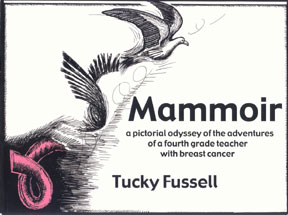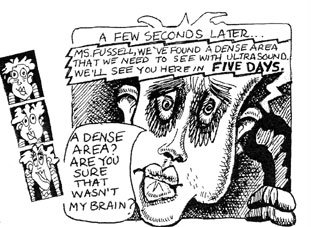Once in a while I'm contacted by a writer, artist, or cartoonist who's heard about Mom's Cancer and invites me to take a look at their work. I don't feel particularly well qualified as a critic, my opinion is of little more value than anyone else's, I don't know any secrets to getting published, and I'm not in a position to help anyone's career but my own (and I'm none too certain there). As long as everyone understands those ground rules and I have the time, I'm usually happy to oblige.
Mammoir is a book written and illustrated by Tucky Fussell, who was a fourth grade teacher in Boston when she was diagnosed with breast cancer. Tucky is currently teaching overseas and her mother, Betty, sent me a copy. It's a remarkable piece of work.
Tucky brought her professional experience as a former advertising writer and commercial artist to Mammoir, which is structured as a series of "teaching units" covering her diagnosis, treatment, reconstructive surgery, and subsequent life. Tucky's black-and-white line art is loose and "undergroundish," sometimes displaying a simplicity and crudeness that looks a lot like spontaneity and urgency to me. I think it's appropriate for this story. Her narrative is imaginative, almost stream-of-consciousness: she interjects pop culture references and Hindu deities into discussions with her breasts (which talk back) and a wise-cracking laboratory rat who follows her around like her own Jiminy Cricket. It's an abstract, very metaphorical trip through Tucky's life and imagination.
While I might disagree with particular narrative or artistic choices, Mammoir accomplishes a lot of things I like. First, it clearly comes from the same impulse that led me to create Mom's Cancer: capture the details of this strange experience, turn something bad into something good, and help other people through similar ordeals. Second, I feel like I get to know the character of "Tucky," like her, and care about what happens to her; that's hard to accomplish in any medium. Third, to the extent that I can tell, it's accurate and honest about cancer; a lot of it was eerily familiar to me because my family lived it, too. Fourth, I simply have a ton of respect for the work and commitment that went into its 176 pages, knowing that she had to start on Panel One of Page One just like I did.
More information about Mammoir--including Tucky's bio, sample pages, and order information--is available at www.mammoir.com. The book is produced by AuthorHouse, a company I don't know but which appears to be a print-on-demand publisher like Lulu or CafePress. The copy I received is well printed and bound, and looks completely professional in every way. Why this do-it-yourself technology hasn't completely revolutionized the publishing industry is beyond me.
Mammoir
Thursday, January 12, 2006
Subscribe to:
Post Comments (Atom)

0 comments:
Post a Comment